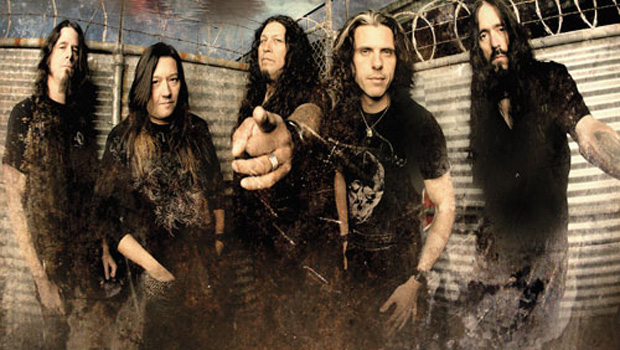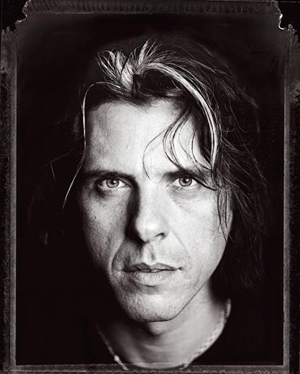Interview: Testament's Alex Skolnick on Practicing, Gear and Taking Lessons from Joe Satriani

Here's part two of my recent interview with guitarist Alex Skolnick of Testament and the Alex Skolnick Trio.
To check out part one, which focused more on Skolnick's unique journey as a jazz fan and guitarist, head here.
When we left off, Skolnick was about to answer questions from readers on a variety of topics -- including taking guitar lessons from Joe Satriani.
GUITAR WORLD: An anonymous reader wants to know what it was like being taught by Joe Satriani.
It was a wake-up call [laughs]. I had already had several guitar teachers at that point, and I always went into these lessons sort of like a lamb where I looked up to all my teachers. I thought, “They’re teachers so they must be the highest level of player,” and I did have a couple of good teachers. But Satriani was the one teacher who showed me everything a teacher should be.
I was so young when I studied with him, I actually think I wasn't ready for a lot of stuff. I was a bit slow with music theory or mechanical elements of playing. I was definitely more of an "ear" player, but I saved the notes from the notebook he gave me, and later, after I had played guitar for two years, I was really ready for that stuff and it really started to take shape. I think he was surprised I turned into the player I was because when I studied with him, I was just a little bit overwhelmed.
I did good, I did my best, I practiced hard. But you the really advanced stuff took a few years to take shape. But yes, studying with him and being able to eventually teach myself, that's the best kind of teacher -- one you can study with who enables you and gives you the tools you need to self-teach.
Get The Pick Newsletter
All the latest guitar news, interviews, lessons, reviews, deals and more, direct to your inbox!
Steve in Massachusetts wants to know about your practice routine with Testament. What was it like when you were on the way up, and how does it differ now?
When Testament was up and coming, that was when we were doing local gigs, clubs in Berkeley and San Francisco. That was the first incentive I had to practice hard and get it together. There is nothing like knowing you're going to be in front of an audience. I remember we used to tape some of the gigs on little cassette recorders that sounded terrible, but you got an idea of how you sounded.
That was also a wake-up call that I really needed to focus. I can’t imagine what it would be like today because now everybody tapes shows with their cell phones and posts them on the Internet for everybody to see. So at least some of those early gigs, they're just memories now. As for my practice routine, I was studying the basic scales. I think one thing that hasn't changed is I always warm up a lot before I have a show. Whatever I need work on, that's what I warm up on. Back then, it was memorizing scales and patterns; now it's more transcribing solos by my favorite artists. I'm always working on lines by Henderson, Chick Corea or John Scofield. So I learned all the scales from that. But then I had to forget them and learn licks and learn how to trust myself.
Did it seem your success with Testament was overnight or more of a grueling process?
It felt like forever, but then again my first big gig with Testament was when I had just turned 16. From that time till the time we did the first record at age 18, it that felt like forever. That's a big chunk of your life. But, you know, now that same amount of time feels like nothing.

Which Testament record are you the most proud of?
I think it's a tie between the second one
The New Order
and the third one,
Practice What You Preach.
I like
Practice What You Preach
because I felt like it had a real identity you can really tap into that a lot of the other bands weren't doing. But as far as staying power, the album that has the most resonance with fans would be
The New Order
. Those are the songs that, more than ever, feel current and timeless.
How did you get hooked up with Heritage guitars, and what effects do you use?
I started playing Heritage when I first got into jazz boxes. I realized that to do the chord melodies and all the Wes Montgomery-inspired stuff I was doing I really needed to change gear. I wanted the same gear the pro-jazz players have and I played mostly that stuff for a few years. It was all made by Heritage, so when the reunited Testament started happening, I had a couple of vintage Les Pauls I was playing. I just felt like I had outgrown the Ibanez guitars from the old days. They were great for back then, but they just didn't feel right. I think I was so used to jazz boxes.
The Les Paul is the one guitar that feels very close to a jazz box. It's got the thickness, and I was just very comfortable with them. I never had a professional relationship with Heritage before, but I guess someone made them aware of me and they got a hold of me and said that they’d like to send me out one of their solid-bodies -- just like a Les Paul but it's handcrafted like the classic Les Pauls and built in the same factory where all these great Les Pauls were built. So I said sure. And yeah, it worked out great. So then they sent me a couple more. Soon I was playing only the Heritages. Then, in the last couple of years, we developed a signature model.
So it's kind of like having a signature Les Paul. Different headstock and it's to my specs -- and it's really great. I think Heritage is one of the only new guitar companies that makes guitars that are as exciting as the ones you find in vintage stores. Like Gruhn Guitars in Nashville or Mandolin Bros. in Staten Island, New York. But I like that, I love shopping. Everybody loves shopping and checking out vintage guitars, but it's very rare that a new guitar has that same excitement, and I just believe in that kind of quality. I think that enhances my playing.
You endorse Seymour Duncan. Which Seymour Duncan pickups do you use?
All my signature Heritages have Seymour Duncans in them. I have the '59 and the JB. It's what I've always used in a Les Paul, even in the early days. My first professional guitar was a Les Paul. I eventually got those pickups, and they just felt right. It's just one of those rare pieces of gear that just seems to work, and it's pretty timeless no matter what other changes my gear goes through. I can even throw Ibanez a bone here. They have a Tube Screamer foot pedal, and it’s the same thing: It's a piece of gear I added in the rehearsal studio in my very first reversals with my band warming up for my first gigs. I read an interview with George Lynch where he said he used one, and here it is all these years later. I still use that as a component to my sound.
I'm often surprised by how many metal players are influenced by jazz. Has metal changed the way you, in particular, play jazz?
Absolutely. I think because I came from metal already, I stood out. Once I got my jazz playing together, there's just a sense of melody and conviction I was able to bring to the table that helped me play. Also the technical ability. At first, that made it more challenging because to play jazz is a much more relaxed intensity than when you play metal. And finding that balance of intensity and total relaxation and concentration is one of the hardest things about doing jazz. But the reverse is true, like having played jazz for so long, it's changed how I approach metal.
It’s not only given me more harmonic possibilities and more melodic ideas, but the zone I get into with jazz is absolutely incredible. And the zone I get into employing metal, it's a completely different rig, it's a completely different tone, it's really like being part of a machine. Whereas when playing in a improvisational group, you don't know what is going to happen, and it requires everybody to have this very sensitive listening. Which is not the case when playing metal. It's not about that. It's about everybody's got to be on the same page and everybody's got to be sort of gelling as a band. And you pretty much know how the song sounds. In jazz you don't know how it's supposed to sound. But I find these very surprising commonalities between jazz and metal.
Also, one of the most important things I have learned playing jazz was from a piano player named Hal Galper who taught me that in jazz the striking of the note is only half of the equation. He helps all of his students create this awareness of not just the striking of the note but the back half. How does the note end? The note, chord, whatever. You don't just hit it; you also have to end, and that's part of the rhythm. It doesn't matter if you're playing a really simple or repetitive part or if you're playing very advanced, fast melodic lines or notes. There still has to be balance and everything has to stay with the rhythm.
So if you listen to a great Miles Davis horn line, for example, the way he comes off of the note is as concentrated and in the groove as the way he starts. And with great heavy metal, that's the case too. If you listen to a great rhythm guitar player like Malcolm Young or James Hetfield, you'll find that the way they come off the notes is just as strong as the way they start the notes.
I often point to “Back In Black” as a perfect example. It's not just the hitting of the note; it's coming off of the note. These are things that are often cool for looks, but both jazz players and metal players and even though the two genres have different types of rhythms, they have that in common. It's been a really interesting thing to notice about both genres.
“This particular way of concluding Bohemian Rhapsody will be hard to beat!” Brian May with Benson Boone, Green Day with the Go-Gos, and Lady Gaga rocking a Suhr – Coachella’s first weekend delivered the guitar goods
“I was writing songs from eight years old, but once I got a guitar I began to deeply identify with music… building an arsenal of influences”: How Lea Thomas uses guitars her dad built to conjure a magic synthesis of folk, pop and the ethereal










